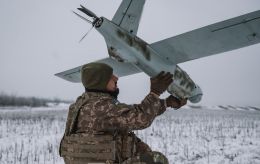Ukraine's intel blew up Russian railway bridge, Scholz's new argument not to send Taurus to Kyiv - Monday brief
 RBC-Ukraine collage
RBC-Ukraine collage
Yesterday, March 4, Defense Intelligence disabled a railway bridge in the Samara region of Russia. Meanwhile, Chancellor of Germany Olaf Scholz ruled out the possibility of supplying Taurus missiles to Ukraine if it required German soldiers to operate.
RBC-Ukraine collected the main news for March 4.
Russia's war against Ukraine: Latest news
- Ukrainian general makes crucial statement about situation on Tavria front
- Armed Forces audit, arms and ammunition supply: Zelenskyy chairs daily meeting
Ukrainian intelligence confirms explosion on Russian bridge
The Defense Intelligence of Ukraine (DIU) has disabled a railway bridge in the Samara region. Currently, traffic on the crossing, which was used to transport ammunition, is paralyzed.
"The Defense Intelligence of Ukraine confirms the fact that the railway bridge over the Chapayevka River in the Samara region was destroyed," the statement says.
Thus, the explosion occurred at about 6 a.m. on March 4. According to the intelligence, the bridge was damaged by blowing up its power structures.
"Given the nature of the damage to the railroad bridge, its use will be impossible for a long time," the DIU adds.
The railway line was used by the Russian aggressor state to transport military cargo, including engineering ammunition produced by the Polimer JSC plant in Chapayevsk, Samara region.
Ukrainian elite brigade identifies potential areas for Western troops involvement
The idea of sending Western troops to Ukraine is good but unrealistic. At the same time, the best option for involving foreign contingents now is to take control of the Belarusian border.
"More and more statements by Western politicians about the possibility of deploying foreign troops in Ukraine are emerging. At present, I consider this idea to be good, but unfortunately, unrealistic," wrote the deputy commander of the Third Separate Assault Brigade, Maksym Zhorin.
He also discussed the practicality of sending Western troops to Ukraine.
"Of course, they (foreign troops - Ed.) definitely won't directly participate in combat. However, they can perform certain tasks - such as conducting instructor activities and some auxiliary work," the deputy brigade commander noted.
According to him, the best option for involving a foreign contingent at the moment is to take control of the Belarusian border.
"We would thus free up part of our forces for the most active areas of the front," Zhorin added.
UK intelligence names targets of Russian drone attacks on Ukraine
The recent airstrikes on Ukraine have targeted industrial sites, with Moscow predominantly opting for kamikaze drones, unlike last year.
Throughout February 2024, Russia conducted a campaign using UAVs against Ukrainian infrastructure, including power facilities.
Ukrainian air defense forces managed to shoot down some drones, but Russia's strikes likely inflicted damage on Ukrainian power plants and substations. These attacks occurred across Ukraine, causing harm to regional energy infrastructure, particularly in the Donetsk, and Dnipro regions, and as far west as Lviv.
According to British intelligence, the Russian attacks were likely carried out using a combination of kamikaze drones, surface-to-surface missile systems, and conventional rocket artillery, rather than long-range aviation assets as seen in 2022 and 2023.
"It is likely that Russia has sought to target regional power facilities to degrade industrial activities in Ukraine. Despite these attacks, Ukraine’s power network is maintaining stable network operations," writes the UK Ministry of Defense.
American drones and chips find their way to Russia: WSJ about supply chains
Drones and computer chips of American origin are increasingly finding their way into Russia from China through the trade routes of Central Asia, underscoring the complexity of supply restrictions for Moscow's military operations.
Trade routes passing through the former Soviet republics of Kazakhstan and Kyrgyzstan are among the many pathways into Russia for so-called dual-use goods that the US and its allies screen out, fearing they could be used on the battlefield.
Despite their efforts, Central Asia remains a growing pipeline for Russia, made possible by thousands of kilometers of open borders, opaque trading practices, and opportunistic middlemen. Goods often come from China, where they are manufactured, sometimes by major American companies claiming that these goods are imported into Russia without their permission.
"The Central Asian trade route is especially important because it feeds a high concentration of Western-produced goods into Russia. It is a key route for microelectronics, car parts, luxury goods - items both used on the battlefield in Ukraine and for personal consumption," says Natali Simpson, a Russia analyst at C4ADS, a Washington-based non-profit research firm specializing in national security issues.
The US and its allies maintain a list of dual-use goods subject to sanctions, including computer chips, routers, and ball bearings used in tanks. Last year, the list comprised 45 items, with five more added in February.
Chinese exports of dual-use goods to Kazakhstan and Kyrgyzstan sharply increased since February 2022.
Another 'but': Scholz's new argument for refusing Taurus missiles to Ukraine
Chancellor of Germany Olaf Scholz rules out the possibility of supplying Taurus missiles to Ukraine if it requires German soldiers to operate.
“You cannot deliver a weapons system that has a very wide reach and then not think about how control over the weapons system can take place,” he said.
He notes that if Germany wants to "have control" over the arms supplied to Kyiv, it is only possible if German soldiers are involved.
"That’s out of the question for me," Scholz stated.
PM hopes Ukraine will join EU immediately after winning war against Russia
Prime Minister Denys Shmyhal hopes Ukraine will become a member of the European Union immediately after winning the war with Russia.
"I have great hope that the political decision on Ukraine's accession (to the EU - ed.) will be made immediately after our victory. I do not believe that the EU will wait for any formalities for Ukraine to do its homework. We will do it, we fulfill all our obligations and we appreciate the advance steps," he said.
Shmyhal adds Ukraine will do its homework in two years.
"I want to believe that Ukraine will become a member of the EU immediately after our victory, after the end of this war. We will do our homework in two years," he said.


